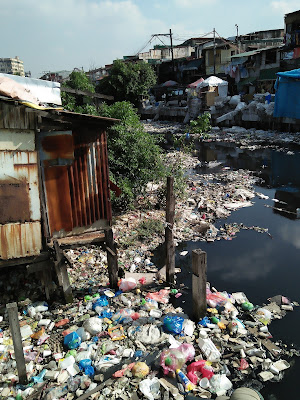Group Asks Metro Manila LGUs and Residents to Stop Garbage Disposal in Waterways
Honorio Lopez Bridge, Tondo, Manila, 18 March 2018
A waste and pollution watch group
exhorted Metro Manila’s 17 local government units (LGUs) and the region’s
almost 13 million residents to prevent illegal garbage disposal in waterways.
The EcoWaste Coalition made the earnest appeal as the 14th anniversary
of Republic Act 9275, or the Clean Water Act, and 25th year of
the World Water Day are both observed tomorrow, March 22.
The group aimed its appeal to the densely populated national capital region,
which generates 9,213 tons of garbage per day or nearly one-fourth of the
40,087 tons of the daily waste generation nationwide.
“March 22 is doubly significant because it coincides with the annual World
Water Day and the 14th year of the Clean Water Act since it was
approved in 2004,” said Daniel Alejandre, Zero Waste Campaigner, EcoWaste
Coalition.
“We hope national and local authorities will seize the occasion to draw support
from all sectors in the uphill task of protecting our water and water
ecosystems against pollution, particularly from irresponsible trash disposal,
which is essential to realizing improved quality of life,” he said.
To mark the occasion, the EcoWaste Coalition highlighted the need for all LGUs
and waste generators to stop improper disposal practices in water bodies
that persist despite clean-up efforts by the Metro Manila Development Authority
(MMDA) and concerned LGUs.
“While some of the 273 esteros in Metro Manila like the Estero de Paco have
been declogged and rehabilitated, many of the region’s waterways remain
polluted with garbage and other pollutants," Alejandre observed.
“It is apparent that compliance to the anti-dumping provisions of the Clean
Water Act and the Ecological Solid Waste Management Act is still unsatisfactory
and has to improve,” he added.
The Clean Water Act prohibits the “discharging, depositing or causing to be
deposited material of any kind into the water bodies… which could cause water
pollution or impede natural flow in the water body.” Fines range from
P10,000 to P200,000 for every day of violation.
The Ecological Solid Waste Management Act, on the other hand, bans the “dumping
of waste matters in public places such as roads, sidewalks, canals, esteros or
parks.” Violators shall be fined P300 to P1,000, or be required to render
one to 15-day community service, or
both.
To promote strict compliance to these laws, the EcoWaste Coalition urged LGUs
to review and strengthen the implementation of their respective Water Quality
Management Action Plans and Local Government Solid Waste Management Plans.
The group specifically sought immediate LGU action to stop the practice of
allowing garbage dumps on streets and even on top or near bridges where
unsorted discards are deposited before being hauled by trucks to disposal
facilities.
“The proliferation of such dumps violates the law banning the dumping of waste
matters in public places, as well as defeats the government’s ongoing drive to
get all dumpsites closed and rehabilitated,” Alejandre emphasized.
To date, 383 open dumpsites and 177 controlled dumpsites continue to operate
all over the country posing serious threats to community health and
environment, especially to the soil and surface and ground water.
-end-
Reference:







Comments